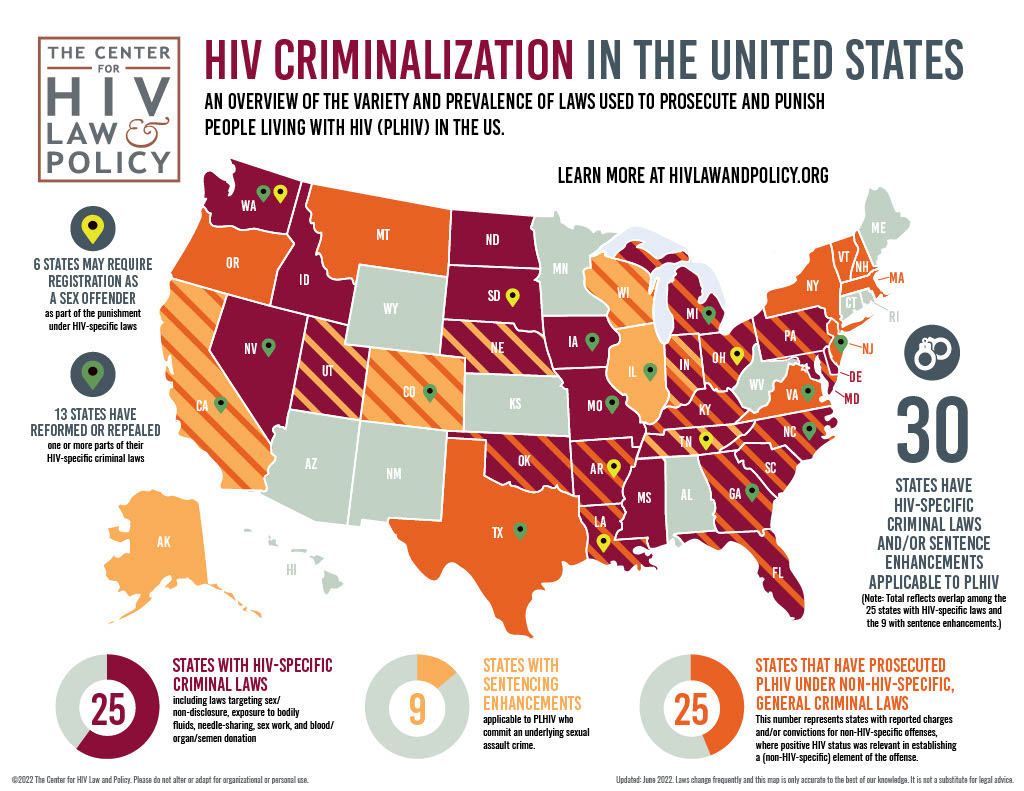Laws criminalizing HIV are harmful and increase risk of violence for people living with HIV – especially for communities most impacted by the epidemic and discriminatorily targeted by law enforcement.
HIV criminalization (see “Key phrases” for definition) is a racial, gender, and economic justice issue. Punishing people simply because they are living with HIV is clearly discriminatory and reinforces institutional stigma.
- HIV Criminalization is racist. Black, Indigenous, and other people of color, especially those who are also women, gay and bisexual men, people of trans experience, people who use drugs, sex workers, and immigrants, are all most likely to acquire HIV in their lifetimes and most impacted by racist over-policing and mass incarceration. This is not a coincidence. It is a consequence of how white supremacy has structured access to healthcare, the criminal legal systems, and public narratives about who is deserving of support in the US.
- HIV Criminalization harms women, femmes, transgender, gender-nonconforming, and nonbinary people. Gender justice is trans justice. HIV criminalization puts all women living with HIV at increased risk of violence, sexual assault, and trauma. This is especially true for Black and Latinx cis and trans women, who are already disproportionately affected by interpersonal violence. Criminalization can force women to choose between potential partner violence if they disclose their status or risk of arrest if they do not, increase the opportunities for police harassment and brutality, and subject them to arrest and incarceration. The threat of arrest may be used as a tool of abuse, harassment, or coercion and is often a deterrent from accessing treatment.
- HIV Criminalization is economic injustice: The collateral impacts of criminalization and incarceration in the U.S are lifelong and put people at increased risk of violence by excluding them from social and economic support systems. Criminal records are often used as justification to block people from accessing housing, employment, health care, and exercising their right to vote. Furthermore, experience with the criminal legal system exaggerates existing prejudices based on racism, homophobia, transphobia, misogyny, and HIV-related stigma.

Source: https://www.hivlawandpolicy.org/resources/map-hiv-criminalization-united-states-chlp-2022
As you can see, HIV criminalization happens in different ways and looks different depending on where you live. “HIV-specific criminal laws” and “sentence enhancements” write discrimination directly into the criminal code. They single out people living with HIV for worse treatment under the law for activities such as spitting, biting, sharing needles, or otherwise exchanging bodily fluids without disclosing their HIV status; for donating organs, tissue, blood, or semen; and/or for engaging in sex work. At the state level, 28 states and 2 territories have HIV-specific laws imposing criminal penalties based on perceived HIV exposure. An extra layer of injustice: six states also require people convicted under HIV-specific laws to register as sex offenders.
Additionally, 25 states have used “general criminal laws” to prosecute people living with HIV. This means the state uses non-HIV specific criminal laws – i.e. laws that could apply regardless of someone’s HIV status, such as “aggravated assault” – to penalize people because of their HIV-positive status. In other words, it is HIV discrimination in practice.
Under federal law, it is a felony criminal offense punishable by up to 10 years in prison or a minimum fine of $10,000 for people living with HIV to donate or sell blood, semen, tissues, organs, or other bodily fluids, even if there is no actual transmission or risk of transmission of HIV. Federal guidelines also allow sentencing enhancements for people living with HIV charged with certain sex offenses.
To learn more about your state’s HIV criminalization laws, see the Center for HIV Law & Policy’s Sourcebook.
Sex Work Criminalization
HIV criminalization puts sex workers at increased risk of harm by 1) intensifying stigma by singling out sex workers living with HIV as a “special danger” to society, 2) limiting their options to report or seek help when they experience violence from clients, partners, or the police, and 3) limiting their ability to choose where and how to work as safely as possible. Additionally, some states have “condoms as evidence” policies, which allow police to confiscate, destroy, and/or use condoms as evidence in charging someone with an offense. Such policies punish sex workers for trying to protect themselves and reduce STI transmissions.
To learn more, see this advocates toolkit by the National LGBTQ Task Force and The Center for HIV Law & Policy.
Drug Use Criminalization
People living with HIV who inject substances face criminalization through HIV criminalization laws, drug possession and distribution criminal laws, and drug paraphernalia possession, purchase, and distribution criminal laws. Criminalization of drug use undermines public health by 1) deterring and punishing proven harm-reduction practices, such as safe syringe programs (SSPs), and 2) increasing stigma, making some people who use drugs less likely to seek testing or treatment for HIV for fear of legal consequences. In turn, HIV criminalization deters people from getting help when they want it because of fear of arrest. Drug paraphernalia criminalization creates additional risks for transgender people living with HIV who use syringes to inject non-prescribed hormones, steroids, or silicone. Systemic racism and discriminatory policing means that Black and Latinx people, LGBTQ people, and people experiencing poverty or homelessness are at a substantially higher risk of incarceration for injection drug use.
To learn more, see this advocates toolkit by the National LGBTQ Task Force and The Center for HIV Law & Policy.
Immigration Criminalization
The consequences of coming into contact with the criminal legal system as a non-citizen in the U.S. can be devastating and result in revocation of residency permission, detention, or deportation. HIV criminalization laws only heighten this risk. People who are undocumented – i.e. people with no visa or other documents verifying legal admission to the U.S. – living with HIV face challenges to accessing treatment and healthcare, especially if they are in custody or detained (where they can now be detained indefinitely!). Conditions in immigration detention are generally deplorable, and have proven deadly for people living with HIV in the past. Information sharing between local law enforcement, Immigration and Customs Enforcement (ICE), and Customs and Border Protection (CBP) further exposes undocumented immigrant living with HIV to police harassment, criminal prosecutions, and detention and deportation.
To learn more, see this factsheet by Positive Women’s Network – USA (PWN) and this report by The Williams Institute.



